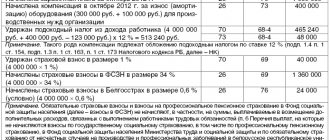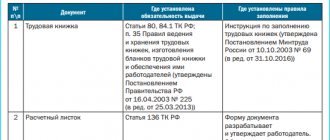Compliance with the norms of social behavior is an unwritten rule in any employment. Theoretically, an ordinary employee may not adhere to them if the negative judgment of others does not cause him discomfort and does not interfere with his work. In this regard, legislators made clarifications for certain categories of specialists whose indecent behavior may provoke dismissal for an immoral act on legal grounds.
Who can be fired for committing an immoral act?
Important! Please keep in mind that:
- Each case is unique and individual.
- A thorough study of the issue does not always guarantee a positive outcome. It depends on many factors.
To get the most detailed advice on your issue, you just need to choose any of the options offered:
- Request a consultation via the form.
- Use the online chat in the lower corner of the screen.
- Call: Moscow region: +7 (499) 938-42-57
- Leningrad region: +7 (812) 467-32-98
- Federal number: +7 (800) 350-83-26
Scope of application of clause 8 of Art. 81 of the Labor Code of the Russian Federation is outlined in the text of the paragraph of the code itself. It states that only employees of educational or educational institutions of any form of ownership can be “kicked out for immorality.” More specifics regarding the practical application of this norm can be found in the law on education in the Russian Federation 273-FZ. In Art. 23 of this normative act lists the types of institutions whose teaching staff must pay special attention to their own actions:
- preschool organizations;
- general education;
- organization of vocational training;
- Universities;
- institutions of further education.
There is a misconception that only teachers or educators can be shown the door due to loss of reputation, since they influence the fragile minds of children. This is far from true, the age of the students does not play a role, and in this sense, university teachers, psychologists, sports coaches, club leaders and master mentors are equally responsible for the moral side of their educational activities.
It is noteworthy that only those professionals whose duties are related to the educational function can fear legal prosecution for indecent acts. If there are representatives on the staff of an educational organization whose job descriptions do not contain such responsibilities, then an offense that violates public morals may result in reprimand from management, but it will not lead to dismissal.
In addition, it would be a good idea to familiarize yourself with the employment law.
https://youtu.be/waSGO6Q2RSY
What act and behavior is considered “immoral”?
If with a circle of persons falling under clause 8 of Art. 81 of the Labor Code of the Russian Federation, while it is quite easy to decide, it is almost impossible to compile an exclusive list of indecent acts. Some immoral acts are classified as criminal or administrative offenses. If an education worker committed any of them, then its essence and circumstances will be reflected in the protocol or court verdict. To these are added everyday situations or behavior in the workplace:
- gross violation of the rules of behavior in society (drunkenness, indecent acts, public manifestations of a severe form of addiction, etc.);
- the use of unjustified physical violence or mental pressure on those being educated;
- involving students in questionable activities;
- other criminal or administrative actions against students or in their presence.
But even in this case, you cannot blindly follow the document you receive and hope that it will protect you from proceedings in the circumstances of a labor dispute. The Labor Code allows dismissal only when the teacher’s action cannot be compatible with the continuation of his educational work. In other words, dismissal for committing an immoral offense is unacceptable if a person violated the rules of crossing the street, exceeded the speed limit, or disturbed the silence at night.
But the behavior of a teacher associated with the use of force against his students, offensive statements, defiant behavior, which set a negative example for those being taught, may well be the subject of consideration by a commission on moral and ethical issues. Less significant misconduct may also be a reason to doubt the suitability of an educator if it is expected to occur continuously and lack a desire to correct the situation.
Dismissal for immoral actions is possible only in cases where this is incompatible with educational work, clause 8 of Art. 81 Labor Code of the Russian Federation.
An immoral act according to the labor code is
Who can be fired for moral misconduct? One of the grounds for dismissal at the initiative of the employer is the commission by an employee performing educational functions of an immoral offense incompatible with the continuation of this work (clause
8 hours 1 tbsp. 81 Labor Code of the Russian Federation). At the same time, the concept of “immoral offense” is not defined by law; the employer himself determines in which case the employee’s actions will be considered immoral.
According to the generally accepted rules for interpreting the concepts of the Russian language, the term “immorality” is a psychological and socio-ethical category, with the help of which a person’s orientation is designated, expressed in rejection of the moral principles of society, a nihilistic attitude towards moral norms, and the spiritual disintegration of the individual.
A written complaint may be accompanied by a medical report confirming harm to physical or mental health, or a psychologist’s report.
Please note: since violation by a teaching employee of an educational institution of the norms of professional conduct or the charter of an educational institution is a disciplinary violation (Article 55
Important
Law on Education) dismissal under clauses 1 and 2 of Art. 336 of the Labor Code of the Russian Federation is carried out after the application of disciplinary measures, in the manner specified in Art. 193 Labor Code of the Russian Federation.
Failure by the employer to comply with the dismissal procedure provided for by the Labor Code and the Education Law entails the reinstatement of the employee through judicial proceedings.
As confirmation, we cite the decision of the Karabudakhkent District Court. O. worked at secondary school No. 5 (hereinafter referred to as the school) as a fine arts teacher.
Features and procedure for dismissal
Since the concept of morality can be interpreted differently even within a small group of equally educated people, management should not arbitrarily decide the career fate of any employee. That is why dismissal for immoral behavior of a teacher or educator will require additional measures to give the procedure legitimacy. Most often, such conclusions must be confirmed by the collegial opinion of the same teachers.
Witnessing the fact of misconduct
If the incident does not fall under the jurisdiction of the police, then the responsibility for recording and collecting evidence will fall on the management of the establishment. In a modern educational institution, obtaining materials and grounds to begin an investigation is not difficult:
- report from a colleague or immediate supervisor;
- complaint from an interested party (parents, guardians, students themselves);
- CCTV data;
- a video shot on the mobile device of one of the participants or witnesses of the events.
Moreover, even if there is no written appeal, but the director has become aware of what happened for certain, an investigation can be started on the initiative of the director. Even materials that initially appeared on the Internet can become an impetus, if they allow us to identify all participants or at least confirm the identity of the teacher.
Registration of the fact of committing an immoral offense
As soon as the signal about the emergency has reached the authorities, it is necessary to secure all the details in the form of an act, attaching to it reports, explanatory and written testimony from eyewitnesses not from the team. For a detailed and objective consideration of the circumstances, it is also necessary to seize or copy video and audio files if they can help establish the true motives and degree of guilt of the employee.
Creation of a commission to investigate the commission of an immoral offense
Conclusions about the immorality of the behavior of one of the employees, made solely by one of the authorized officials, will immediately raise doubts about their objectivity. To avoid distortion of facts, specialized commissions are created in educational institutions to assess the severity of the offense and the extent of its impact on further educational work.
The composition of the commission must be approved by order. Moreover, it should include only those who cannot be accused of systematic violations in the field of ethics. The principles for forming a commission by name depend on what is written in the internal local act (appointment of members by decision of the manager or elections within the team). In particularly difficult cases, it is permissible to involve third parties in the commission as experts (psychologists, lawyers, technical specialists, etc.).
The circumstances of the act and its consequences are considered collectively.
Registration of the decision of the commission to investigate the commission of an immoral offense
The main task of the commission is not to consider the evidence and establish the fact of violation of discipline and morality. The primary task of the board is to justify the answer to the employer’s doubts about whether it is possible to fire a teacher for immoral behavior in a specific situation.
How the meetings of this “judicial” body will be held is not specified in the legislation. But it seems logical that based on the results of the meeting, a report on the review will be drawn up, and all supporting documents will be attached to it. An obligatory part of the act or minutes of the commission meeting should be an unambiguous conclusion about the possibility of further work with students.
Obtaining an explanation from an employee who has committed an immoral offense
Making an objective decision is impossible without taking into account the opinions and circumstances of the other party. If everything happened on the territory of the educational organization, the director must necessarily consider the employee’s explanations, Art. 193 TK. From this it logically follows that it is enough to offer to write an explanatory note in writing, present it to the offender against signature, and then wait at least two days until the results of the internal inspection are approved.
If after a couple of days an explanation is not provided, the employer has every reason to make any decisions without taking into account the details known to the dismissed employee.
Committing indecent acts outside of work or at home is exempt from the obligation to wait for an explanation. However, judicial practice suggests that it must be required in any case, so that the results of consideration by the labor dispute commission or in court do not come as a surprise to the employer.
Obtaining an explanation from an employee who has committed an immoral offense
https://www.youtube.com/watch?v=ytcreatorsru
If, after two working days from the date of presentation of the demand, the employee has not provided an explanation, then the corresponding act is drawn up (Article 193 of the Labor Code of the Russian Federation). If there is such an act and a document indicating that an explanation was requested from the employee, the issuance of an order (instruction) on termination (termination) of the employment contract is possible without an explanatory note (Article 193 of the Labor Code of the Russian Federation).
If the employee did not work on the day of dismissal, then these amounts must be paid no later than the next day after the dismissed person presents the corresponding demand (Article 140 of the Labor Code of the Russian Federation). However, the Labor Code of the Russian Federation does not establish the form of such treatment. This means that an oral statement from the employee is sufficient.
If a dispute arises about the amounts to be paid (for example, about the amount of compensation for unused vacation or bonuses), these issues are resolved after the termination of the employment contract in the manner prescribed for the consideration of an individual labor dispute (Chapter 60 of the Labor Code of the Russian Federation).
Terms of dismissal
The right to exclude a teacher with a “tarnished” reputation from the teaching staff does not depend on the place on the map. The only difference is to determine the procedure and timing of dismissal:
| Scene of the incident | Procedure | Timing of dismissal |
| The offense occurred during working hours within the educational institution or in front of students. | In order to impose a disciplinary sanction, Art. 193 Labor Code of the Russian Federation. | Within a month from the date of discovery, but no later than 6 months after its occurrence. |
| It all happened after work or at home. | Adhere to Art. 193 of the Labor Code of the Russian Federation there is no reason, since dismissal will not be qualified as a disciplinary punishment, but will become a termination of the contract on certain grounds. | The settlement at the initiative of the directorate should be implemented no later than a year from the date of discovery of the offense or the provision of reliable information about its commission, paragraph 47 of the Resolution of the Plenum of the Armed Forces of the Russian Federation No. 2. |
| The offense occurred during working hours either within or outside the educational institution, but this did not interfere with the performance of educational functions. | If there are signs of a disciplinary violation, the appropriate punishment can be applied to the employee, Art. 193 Labor Code of the Russian Federation. | Grounds for dismissal in accordance with clause 8 of Art. 81 of the Labor Code of the Russian Federation no longer exists. Termination of the employment relationship is only possible if the employee already has outstanding penalties. |
Removal from work of a teacher who has committed an immoral offense is possible only if a criminal offense is committed, Art. 76 Labor Code of the Russian Federation.
“Working out” upon dismissal for immoral behavior
Labor legislation does not contain such a concept as “working off” upon dismissal. However, in some cases the code establishes an employee’s obligation to notify management of his intention to stop working in advance. In case of leaving of one's own free will, employers must be notified of this at least two weeks in advance, and in case of dismissal during the probationary period - three days in advance. If the work is performed on the basis of a fixed-term contract, then the date of dismissal is determined by the end date of the contract or an agreement between the parties.
Attention
In the event of termination of employment due to immoral behavior, the issue of “working off” is not relevant at all. The date of dismissal is determined by the manager, taking into account the deadlines indicated above.
What payments are due?
The degree of unethicality of the offense or the personal opinion of management regarding the guilty person cannot change the list of guaranteed payments upon dismissal. The Labor Code of the Russian Federation includes:
- salary;
- compensation for unpaid paid leave (both regular and additional);
- the amount of all agreed and undisputed debts existing on the settlement day;
- other payments specified in the collective agreement or individual contract, if they are appropriate in this particular case.
It should be noted that the norms of internal regulations (regulations, orders, collective agreements, etc.) in judicial practice are interpreted in favor of the employee. This means that if they do not directly prohibit the payment of severance pay to someone who leaves due to discreditable circumstances, the money must be issued in the prescribed amount on the day the order is read.
Is there a workaround?
In the Labor Code there is no concept of working off at all, there is only a mention of the period for warning the employer about leaving. It is too optimistic to assume that management will retain an employee who has compromised himself in the eyes of colleagues and students.
It’s another matter if the parties have agreed on non-disclosure of the circumstances of the investigation, and the employee writes an application for voluntary settlement. But even in this case, it would not even occur to the director to detain a teacher in relation to whom there is evidence of vicious behavior.










